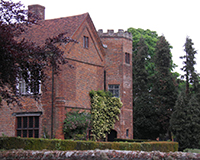The wife of a Labour peer, who says an industrial development near her 16th century home will be an eyesore, has been handed a slim chance of having the planning permission quashed.
Sales J rejected most grounds of challenge advanced by Lady Hart of Chilton, who is opposed to Babergh District Council’s grant of permission to developer Highbridge Properties and marketing company Promotional Logistics (Prolog) to build two detached industrial buildings near her Grade II listed home, Chilton Hall at Sudbury.
However, he upheld her claim that the council breached the Town and Country Planning (Consultation) (England) Direction 2009 by failing to refer the application for planning permission to the communities secretary to decide whether he should call in the matter to decide himself.
He ruled that an out of town development is caught by the direction if it is in excess of 5,000 square metres and includes an element of class B1 office space. The permission under challenge, granted by the council in January, approved two large detached industrial warehouses, with a combined floorspace of 26,385 square metres and mixed uses B1, B2 and B8.
The judge declined to quash the decision immediately, but ruled that the secretary of state should be given the opportunity to decide whether to call the matter in. If he declines to do so, the permission will stand, but if he calls it in the council’s decision will have to be quashed.
Expressing the view that a call in may not be likely, the judge said: “It does not seem that the proposed development is of a kind that the secretary of state would usually wish to call in for his own decision. It may well prove to be the case that, once informed of the application, he will decide not to call it in; but I cannot conclude that this will inevitably be the case.”
The judge rejected several other grounds of challenge put forward by Lady Hart, who says that the development will harm the setting of Chilton Hall, cause substantial damage to the setting of Grade I listed St Mary’s Church in Chilton, and harm the local environment through noise, light and traffic movements.
She claimed that, having recognised the substantial harm that would result, the council had to be satisfied that it was justified by wholly exceptional circumstances and substantial public benefits.
The council considered that the development would allow for Prolog to expand its current operations in Sudbury, delivering a further 500 jobs for the area, but Lady Hart claimed this was not enough in the absence of a workable planning obligation guaranteeing those benefits.
The judge ruled that the planning agreement secured by the council following extensive negotiations with Prolog was one which it could properly and rationally conclude, as a matter of planning judgment, as representing the best terms available. He said that it was entitled to conclude that the agreement had a good prospect of securing “very substantial socio-economic benefits for the council’s area”.
The grounds of Chilton Hall are registered as a park and garden of special historic interest by English Heritage, while the water filled moat that surrounds it is considered an ancient monument in its own right.
The Queen on the application of Lady Hart of Chilton v Babergh District Council Planning Court (Sales J) 14 October 2014
Gregory Jones QC and Sarah Sackman (instructed by Herbert Smith Freehills LLP) for the claimant
Robin Green (instructed by Babergh District Council) for the defendant








